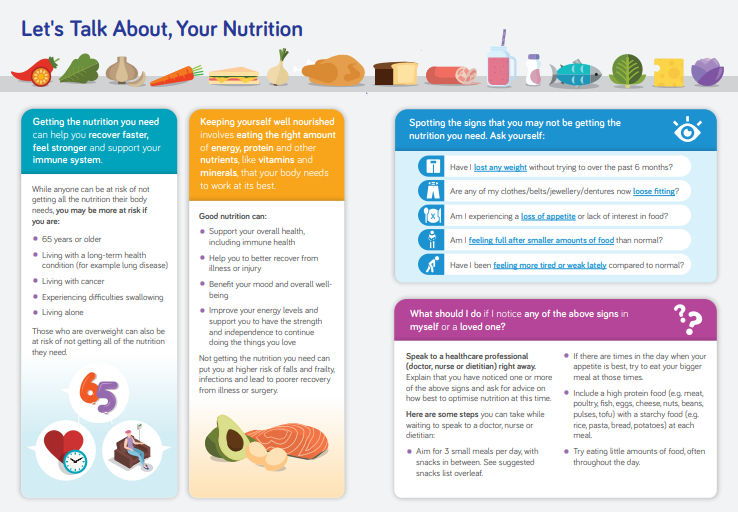Let's talk about your nutrition
Nutrition plays a hugely important role in supporting our everyday health and wellbeing, but did you know that getting the nutrition you need can also help you to recover faster from illness and injury, feel stronger in your day to day and support your immune system to function at its best.
It’s not always easy to make sure your body is getting all of the nutrients that it needs, especially when you’re feeling under the weather. While anyone can be at risk of not getting all the nutrition their body needs, you or a loved one may be more at risk if you are:
- 65 years or older
- Living with a long-term health condition (for example lung disease)
- Living with cancer
- Experiencing difficulties swallowing
- Living alone
It’s important to remember that people who are overweight can also be at risk of not getting all of the nutrition they need.
Keeping yourself, or a loved one, well-nourished involves eating the right amount of energy, protein and other nutrients, like vitamins and minerals, that your body needs to work at its best. Good nutrition can:
- Support your overall health, including immune health
- Help you to better recover from illness or injury
- Benefit your mood and overall well-being
- Improve your energy levels and support you to have the strength and independence to continue doing the things you love to do
Not getting the nutrition you need can put you at higher risk of falls and frailty, infections and lead to poorer recovery from illness or surgery.
Start by asking yourself or your loved one:
- Have I/you lost any weight without trying to over the past 6 months?
- Are any of my/your clothes/belts/jewellery/dentures now loose fitting that weren’t before?
- Am I/are you experiencing a loss of appetite or lack of interest in food?
- Am I/are you feeling full after smaller amounts of food than normal?
- Have I/you been feeling more tired or weak lately than normal?
Speak to a healthcare professional (doctor, nurse or dietitian) right away. Explain that you have noticed one or more of the above signs and ask for advice on how best to optimise nutrition at this time.
Here are some steps you can take while waiting to speak to a doctor, nurse or dietitian.
- Aim for 3 small meals per day, with snacks in between. See suggested snacks list below.
- Avoid skipping meals. Try to eat or drink something nourishing every 1-2 hours. Try a few mouthfuls even when you’re not hungry.
- If there are times in the day when your appetite is best, try to eat your bigger meal at those times.
- Include a high protein food (e.g. meat, poultry, fish, eggs, cheese, nuts, beans, pulses, tofu) with a starchy food (e.g. rice, pasta, bread, potatoes) at each meal.
- Try eating little amounts of food, often throughout the day.
- Nourishing drinks (see below) are a good way to get in some extra energy and protein.
- Avoid overfilling your plate, as this may put you off eating.
- Avoid low-fat or diet foods, unless you have been previously advised by a healthcare professional to opt for these types of foods.
- If you can only manage certain foods, continue to eat them. Do not worry if you lack variety for now.
- Sweet: yoghurts, rice pudding, custard, yoghurts (with or without honey/granola/seeds), flapjacks, cereal bars, scones or banana bread.
- Savoury: cheese, nut butter or hummus/guacamole with crackers/toast/breadsticks, handful of nuts/seeds, natural yoghurt or savoury scone
- Drinks: milk, milky coffees (e.g. latte), malt drinks, hot chocolate made on milk, homemade smoothies made with yoghurt or milk as a base.
- BAPEN* have created an online tool to help you to check if you are losing too much weight without trying to. This tool is designed to help identify people who may be at risk of not getting the nutrition they need. Different words can be used to describe not getting all of the nutrition your body may need, and these words may include “undernutrition” or “malnutrition”.
- If you are worried about weight loss, check out the BAPEN online screening tool by clicking here: Worried About Weight Loss - Self-Screening for Malnutrition
- Always speak to your GP or healthcare professional if you have any concerns, or if you find that you score at medium or high risk using this screening tool.
* BAPEN (British Association for Parenteral & Enteral Nutrition) is a Charitable Association that raises awareness of undernutrition and works to improve nutritional care.
Your doctor, nurse or dietitian may recommend that you start taking an Oral Nutritional Supplement (ONS) to help optimise your nutritional intake. These are drinks containing a concentrated source of energy, protein, vitamins and minerals. ONS come in many different flavours, styles and sizes and should always be taken in addition to meals and snacks. Always follow your healthcare professional’s advice on ONS.
Keep an eye on how you’ve been eating and feeling. If you notice any of the signs mentioned above, speak to your doctor, nurse or dietitian.

For more information on oral nutritional supplements, visit this link: Oral Nutritional Supplements
Information for patients and/or their carers. This advice does not replace the advice of the managing healthcare professional.
